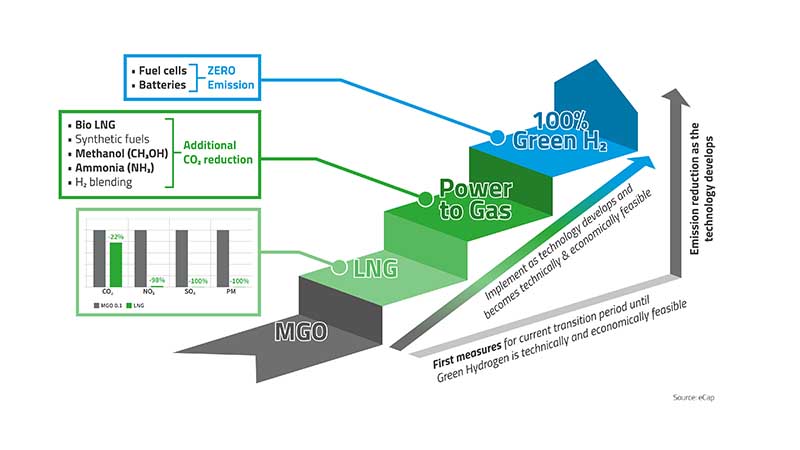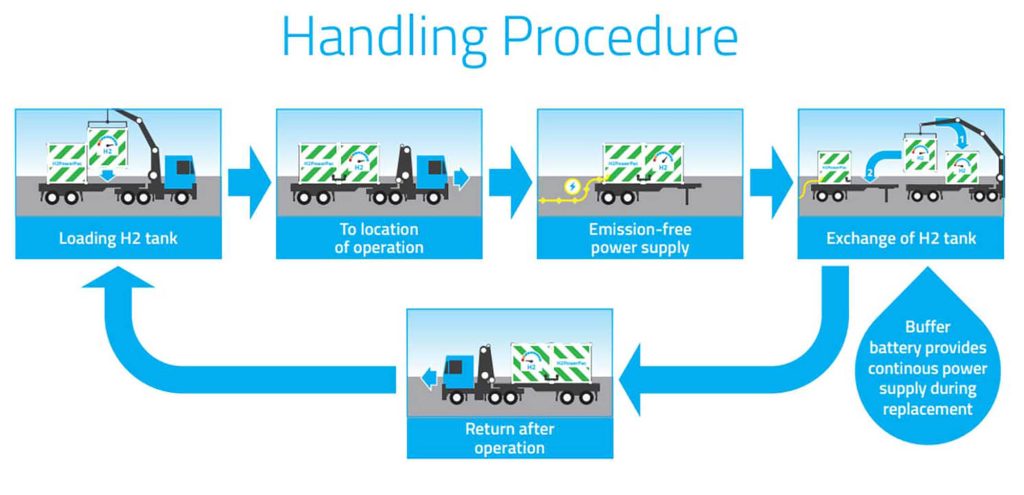E-Cap Marine (formerly known as HPE Hybrid Port Energy) is an innovative technology company in Hamburg, Germany, expertises in deploying and realizing low-emission, sustainable mobility in waterways and alternative clean energy supply on Land. Since the early 2010s, it has developed and implemented different either LNG-based or hybrid clean mobile shore power technology solutions (aka. Onshore Power Supply – OPS) for Container ships and Cruiser ships, for some of which it still supports with the operation, on behalf of the contractee.
Interview with Lars Ravens, Managing Director at E-Cap Marine GmbH.
Easy Engineering: What are the main areas of activity of the company?
Lars Ravens: By extending its Product Portfolio, eCap Marine also enhances emission-free technologies such as Fuel Cells and environmental-friendly Battery Systems (also for energy storage) into compact, semi-/mobile containerized PowerPacs as Auxiliary Power Unit (APU) or for decentralized electricity supply, like CHP (Combined Heat and Power Plant). It also offers full electrification conception and customized solutions for maritime Ships/Yachts/Units, either newbuilds or retrofits. With its solid technological Know-hows and real-life operational experiences, eCap Marine will work closely with clients – from concepting, design, construction and to the final implementation.

E.E: What are the most innovative products marketed?
L.R: Those continuous efforts for developments and innovations of eCap Marine’s technology solutions over the years, accomplished eCap EPS (Electrical Power System), which guided solidly by eCap’s core engineering advancements & pursuits – enabling a compact and semi-/mobile power generation system, either applicable as an integral part of vessel in waterways, or for on land clean power generation and supply. Based on each specific application scenario, together with requests and specifications from clients, every eCap EPS can be customized and then configurated to be based on H2 as H2EPS (aka. H2PowerPac), or based on battery, as Battery EPS (aka. Battery PowerPac) and based on gas engine, such as LNG PowerPac (Liquified Natural Gas) or LBG PowerPac (Liquified Bio Gas) etc.
All those variations are implemented with eCap Marine’s novel USPs, which can be traced back to and are certainly derived & evolved from its very first technology innovations: Power Barge, especially Becker PowerPac. By being compact and movable power generation systems, priming themselves for being flexible and guarantee stable, decentral (off-grid) power supply. Example applications are as Onshore Power Supply (OPS) or APU facilities in ports; silent and emission-free power supply for construction sites, remote areas, festivals, and so on.
Compared to its peers of today, the compact eCap EPS has small footprint while all key and required components are integrated. Hence, apart from land base applications, eCap EPS is advantageous for installation on board of vessels, as battery, hydrogen, or hybrid-drive, either for retrofits or for newbuilds.
Hydrogen Power Generator (eCap H2PowerPac)
Take eCap Marine‘s H2PowerPac as an example – It harnesses the hydrogen fuel cell electric generator technology, a mobile, emission-free fuel cell generator designed to revolutionize how the industry generate and consume electricity. This progressive technology innovation and advancement ushers in a new era of energy production, enables an efficient and eco-friendly electricity production pathway, holding immense potential to drastically curtail our dependence on fossil fuels.
An Electro-Hydrogen Powered Generator allows to generate electricity on own terms and deploy renewable energy to reduce the carbon footprints, whenever and wherever it is needed. A H2PowerPac is a modular, portable and compact power plant, integrated with advanced fuel cell technology, batteries and one or multiple swappable hydrogen tank system(s). The innovative design enables easy transportability via trailer truck or integration into vehicles.
Therefore, whether it is stationed at remote and isolated sites, like construction, outdoor festivals & sporting events, or simply needed reliable emergency backup power source – H2PowerPac grants full control over autarkic power supply, unhindered by the limitations of traditional energy source.
Each H2PowerPac can be customized for specific power demand, with one single PowerPac generating up to 1000 kW of emission-free electricity, multiple units can be cascaded for higher power demands. A H2PowerPac can also incorporate alternative fuel cell technology using green methanol.
The Hydrogen to electricity Generator is not just a generator – it represents a major leap towards a cleaner, sustainable, and efficient energy future. Choosing H2PowerPac today means opting for a world achieves zero-emissions and a sustainable electric supply. This technology solution aligns with the global shift towards sustainable industrial practices, allowing reduction of carbon footprint while maintaining operational efficiency.

Semi-mobile Installation onboard of a vessel, as hybrid drive solution and extended driving range.

Outlook with Green Hydrogen Green hydrogen – when produced through electrolysis using renewable energy sources such as solar or wind power, is gaining widespread recognition as the optimal solution for zero-emission, sustainable power generation. These energy sources align with global energy and climate objectives, making them highly favored by governments and the majority. Therefore, green hydrogen stands as a key player in achieving worldwide energy safety and climate targets.
Onshore Power Supply (OPS)
Shore-to-Ship Power via Shore-to-Ship Crane: Efficient STS Power System
E-Cap Marine has developed and customized different technology solutions for Onshore Power Supply (OPS). One of them is the STS Power System (Shore-to-ship Power via shore-to-ship Crane). This technology enables utilisation of the electrical capacity of STS crane for shore power purpose, therefore can supply electricity to container ships during their layover in ports, reducing their emission from the auxiliary engines. eCap’s STS Power System enables a direct, quick and stable power supply from the grid (e.g. 10kV /50Hz) to the ship (6.6kV / 60Hz).
This compact system includes a Static Frequency Converter (SFC) and a transformers or rotary converter for voltage and frequency adjustment of the container crane, all components being integrated and fit into the size of a 20ft or 40ft container. An additional cable reel for the cable routing between the junction box (socket IEC80005-1) will be located at the dockside and only during the shore power supply operation. Otherwise, the junction box is lifted to the STS crane and moves with the crane. No further construction or cable routing is needed at the quayside.

E.E: What can you tell us about market trends?
L.R: It is encouraging to see that the FuelEU Maritime recently has confirmed a clear and gradual agenda for the shipping industry. Meanwhile, increasing numbers of shipowners and port authorities actually seek to move ahead with plans to decarbonise their vessels or ports by deploying alternative fuels for power generation, including biofuels, synthetic fuels, green hydrogen, methanol, ammonia etc.
From eCap Marine’s perspective, as the emission-free power generation technology solutions and engineering provider in the forefront, we can also confirm that the maritime industry is exhibiting stronger demand for a range of lower-emission and green fuel power generation and propulsion technologies, to combat the environmental impact of shipping.
E.E: What estimations do you have for 2023?
L.R: This demand is catalyzing the accelerated adoption of green fuels and the pursuit of full decarbonization by 2050, as evidenced by the commitments made by leading entities in the shipping value chain and green fuel producers. The industry’s ambitious targets and commitments are expected to unlock cost reductions and reduce investment risk, which in turn is spurring growth in investments and the production of green solutions and fuels. However, achieving these targets is crucially contingent upon cross-sector collaboration, technological innovation, supportive as well as regulative policies from international authorities and national governments, to create opportunities for zero-emissions fuels and technologies to thrive and quickly achieve scale. Therefore, these decarbonising objectives cannot be achieved in a short term, nor in 2023 or 2024. Instead, continuous, long-term joint efforts are required from each organization and individual. E-Cap Marine will continue to take part in and contribute to this cooperative strive.

